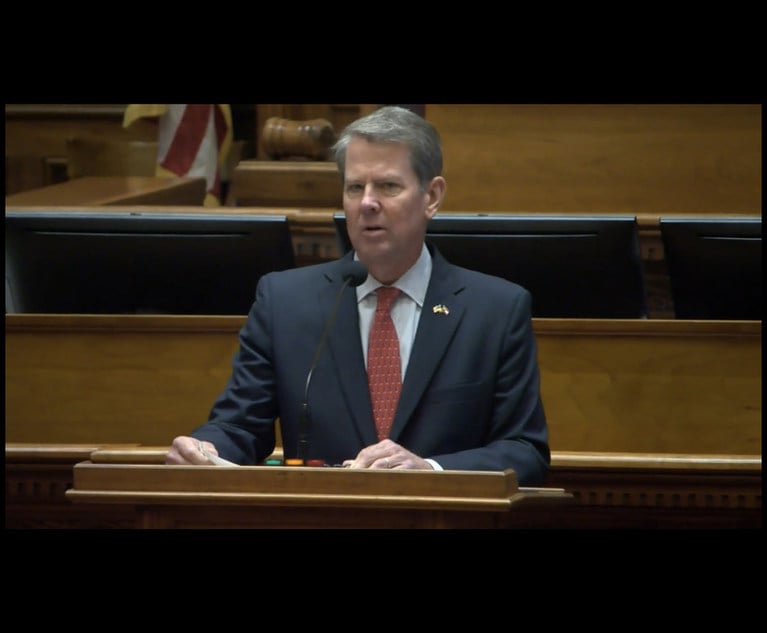Secretary of State Asks Federal Judge to Dismiss Fair Fight Lawsuit
Counsel for Georgia's new secretary of state and the State Election Board say they should not be sued in a sweeping lawsuit intended to reform Georgia's election system, claiming they don't implement state election laws. But testimony from the director of the state's Center for Elections Systems shows the secretary is the architect of all elections, even down to the precinct level.
January 30, 2019 at 06:02 PM
6 minute read
 Bryan Tyson (left) and Josh Belinfante (Courtesy photo/ALM)
Bryan Tyson (left) and Josh Belinfante (Courtesy photo/ALM)
Attorneys for Georgia's new secretary of state have asked a federal judge to dismiss a sweeping lawsuit demanding large-scale reforms of the state's election system, claiming the secretary doesn't implement state election laws.
But testimony by the secretary of state's director for the Center for Elections Systems during a recent trial contesting the lieutenant governor's election, demonstrated that the secretary of state is largely the architect of state elections and provides county officials the blueprints—and software—to run them.
The suit was filed by a new nonprofit organization—Fair Fight Action—founded by Democrat Stacey Abrams after she ended her gubernatorial campaign but refused to formally concede to Republican Brian Kemp. Kemp the was secretary of state and chairman of the State Election Board before he was elected governor. The suit names the secretary of state, the election board and its members as defendants.
The lawsuit seeks to end many of the policies affecting Georgia's elections that Kemp implemented while secretary of state and that Abrams repeatedly branded as voter suppression. Kemp remained secretary of state as he campaigned for governor and while ballots were still being contested after the election. He stepped down and declared himself the winner shortly after the election as a federal judge was considering a lawsuit to forcibly remove him.
Fair Fight's suit alleges broad constitutional, civil rights and voting rights violations, as well as significant breaches of federal election laws. It asks the federal court to take jurisdiction over Georgia's elections so that no policy, standard, practice or procedure governing them may be enacted without court approval.
For nearly 40 years, the U.S. Justice Department's civil rights division handled that role—policing Georgia's elections and those of eight other states under the Voting Rights Act of 1965. But DOJ's role ended in 2013 when the U.S. Supreme Court invalidated a key provision of the Voting Rights Act that required preapproval of changes in election laws and voting procedures.
In seeking to dismiss the suit, counsel for newly-elected Secretary of State Brad Raffensperger and the elections board contend that Fair Fight's suit is “a policy critique that is more appropriately reviewed by the Georgia General Assembly,” which they argue “is already considering changes to Georgia's election system.”
They also claim the lawsuit is merely a vehicle for Fair Fight Action and co-plaintiff Care in Action—a nonprofit advocating for the rights of domestic workers—“to enact their preferred policies not through state government or the legislature, but through the federal judiciary.”
Care in Action's state director is Georgia Democratic Party chairwoman and state Sen. Nikema Williams.
Joshua Belinfante of The Robbins Firm and Bryan Tyson of Atlanta's Strickland Brockington Lewis have been appointed special assistant state attorneys general to defend Raffensperger and the election board. Tyson was in court and unavailable for comment Wednesday. Belinfante declined to comment.
In asking Judge Steve Jones of the U.S. District Court for the Northern District of Georgia to dismiss the case, defense lawyers argue that Fair Fight's lawyers erred in “alleging that the Georgia Secretary of State 'oversees and administers elections.'”
“The Secretary must provide training to county election officials but he does not watch them process voter registration applications, count ballots, administer provisional ballots, or control how local official undertake those activities,” defense counsel claimed.
“Defendants do not control and cannot directly prevent a local official(s) from 1) closing polling places, 2) not distributing provisional ballots, 3) not allocating sufficient resources to polling places or 4) processing absentee ballots,” they argued.
“All of these are county functions as a matter of law—not the responsibility of defendants.”
Fair Fight Action and Care in Action are represented by Atlanta attorney Allegra Lawrence-Hardy and a team of lawyers from Atlanta's Lawrence & Bundy; Elizabeth Tanis, a retired King & Spalding partner, and husband John Chandler, a former partner at Atlanta's Sutherland, Asbill & Brennan (now Eversheds Sutherland); and Kurt Kastorf of Atlanta's The Summerville Firm. Plaintiffs' counsel also include attorneys from KaiserDillon, Miller & Chevalier Chartered, Jenner & Block, and Sandler Reiff lamb Rosenstein & Birkenstock in Washington, D.C.
The state's motion to dismiss the Fair Fight suit sidesteps the extent of the secretary of state's involvement in all state elections. Its website says the elections division “organizes and oversees all election activity, including voter registration, municipal, state, county, and federal elections” and is “responsible for certification of election results as well as certifying the qualification of candidates and preparation of ballots and election forms and materials.”
Michael Barnes—hired by Kemp as director of the Center for Elections Systems—elaborated on the degree to which the secretary of state orchestrates state elections in court testimony earlier this month.
According to Barnes, the Elections Division
- Does database programming for all of the state's elections.
- Houses and operates the system that generates the databases used by every county and sends those databases to the counties and encrypted CDs to carry out each election.
- Oversees all voting equipment used across the state, most of which is also owned—and controlled—by the state rather than the counties.
- Constructs the election databases for all 159 counties.
- Builds and designs ballots used in every jurisdiction across the state.
According to Richard Barron, Fulton County's elections director who also testified, the secretary of state maintains the state voter registration system. Every voting precinct in the state accesses the state system via electronic poll books that tell poll workers whether a voter is eligible to vote and selects the correct ballot.
Memory cards that operate every electronic voting machine used by the counties are programmed utilizing the databases provided by the secretary of state, he said.
The secretary of state maintains so much oversight that even after the secretary was dismissed from a lawsuit challenging the election of Lt. Gov. Geoff Duncan over apparent anomalies in the ballot tallies, the secretary's counsel instructed Fulton County election officials as to how and whether to carry out court-ordered discovery involving its electronic voting machines.
Fulton County lawyers explained at the time that the voting machines are owned by the state and the secretary of state “is the chief election officer and oversees the unified voting system in Georgia.”
Fair Fight CEO Lauren Groh-Wargo, Abrams' former campaign manager, suggested Tuesday that the state “continues to pretend they are not culpable of disenfranchisement.”
“Our lawsuit will lay out compelling and irrefutable evidence of an interlocking system of voter suppression that has unfairly impacted election outcomes in our communities and that cannot be allowed to stand,” she said.
This content has been archived. It is available through our partners, LexisNexis® and Bloomberg Law.
To view this content, please continue to their sites.
Not a Lexis Subscriber?
Subscribe Now
Not a Bloomberg Law Subscriber?
Subscribe Now
NOT FOR REPRINT
© 2025 ALM Global, LLC, All Rights Reserved. Request academic re-use from www.copyright.com. All other uses, submit a request to [email protected]. For more information visit Asset & Logo Licensing.
You Might Like
View All
Georgia Republicans Push to Limit Lawsuits. But Would That Keep Insurance Rates From Rising?
5 minute read
A Plan Is Brewing to Limit Big-Dollar Suits in Georgia—and Lawyers Have Mixed Feelings
10 minute read
Panel to Decide if Governor Should Suspend Georgia Lawyer From Elected Post
4 minute readTrending Stories
- 1Uber Files RICO Suit Against Plaintiff-Side Firms Alleging Fraudulent Injury Claims
- 2The Law Firm Disrupted: Scrutinizing the Elephant More Than the Mouse
- 3Inherent Diminished Value Damages Unavailable to 3rd-Party Claimants, Court Says
- 4Pa. Defense Firm Sued by Client Over Ex-Eagles Player's $43.5M Med Mal Win
- 5Losses Mount at Morris Manning, but Departing Ex-Chair Stays Bullish About His Old Firm's Future
Who Got The Work
J. Brugh Lower of Gibbons has entered an appearance for industrial equipment supplier Devco Corporation in a pending trademark infringement lawsuit. The suit, accusing the defendant of selling knock-off Graco products, was filed Dec. 18 in New Jersey District Court by Rivkin Radler on behalf of Graco Inc. and Graco Minnesota. The case, assigned to U.S. District Judge Zahid N. Quraishi, is 3:24-cv-11294, Graco Inc. et al v. Devco Corporation.
Who Got The Work
Rebecca Maller-Stein and Kent A. Yalowitz of Arnold & Porter Kaye Scholer have entered their appearances for Hanaco Venture Capital and its executives, Lior Prosor and David Frankel, in a pending securities lawsuit. The action, filed on Dec. 24 in New York Southern District Court by Zell, Aron & Co. on behalf of Goldeneye Advisors, accuses the defendants of negligently and fraudulently managing the plaintiff's $1 million investment. The case, assigned to U.S. District Judge Vernon S. Broderick, is 1:24-cv-09918, Goldeneye Advisors, LLC v. Hanaco Venture Capital, Ltd. et al.
Who Got The Work
Attorneys from A&O Shearman has stepped in as defense counsel for Toronto-Dominion Bank and other defendants in a pending securities class action. The suit, filed Dec. 11 in New York Southern District Court by Bleichmar Fonti & Auld, accuses the defendants of concealing the bank's 'pervasive' deficiencies in regards to its compliance with the Bank Secrecy Act and the quality of its anti-money laundering controls. The case, assigned to U.S. District Judge Arun Subramanian, is 1:24-cv-09445, Gonzalez v. The Toronto-Dominion Bank et al.
Who Got The Work
Crown Castle International, a Pennsylvania company providing shared communications infrastructure, has turned to Luke D. Wolf of Gordon Rees Scully Mansukhani to fend off a pending breach-of-contract lawsuit. The court action, filed Nov. 25 in Michigan Eastern District Court by Hooper Hathaway PC on behalf of The Town Residences LLC, accuses Crown Castle of failing to transfer approximately $30,000 in utility payments from T-Mobile in breach of a roof-top lease and assignment agreement. The case, assigned to U.S. District Judge Susan K. Declercq, is 2:24-cv-13131, The Town Residences LLC v. T-Mobile US, Inc. et al.
Who Got The Work
Wilfred P. Coronato and Daniel M. Schwartz of McCarter & English have stepped in as defense counsel to Electrolux Home Products Inc. in a pending product liability lawsuit. The court action, filed Nov. 26 in New York Eastern District Court by Poulos Lopiccolo PC and Nagel Rice LLP on behalf of David Stern, alleges that the defendant's refrigerators’ drawers and shelving repeatedly break and fall apart within months after purchase. The case, assigned to U.S. District Judge Joan M. Azrack, is 2:24-cv-08204, Stern v. Electrolux Home Products, Inc.
Featured Firms
Law Offices of Gary Martin Hays & Associates, P.C.
(470) 294-1674
Law Offices of Mark E. Salomone
(857) 444-6468
Smith & Hassler
(713) 739-1250







